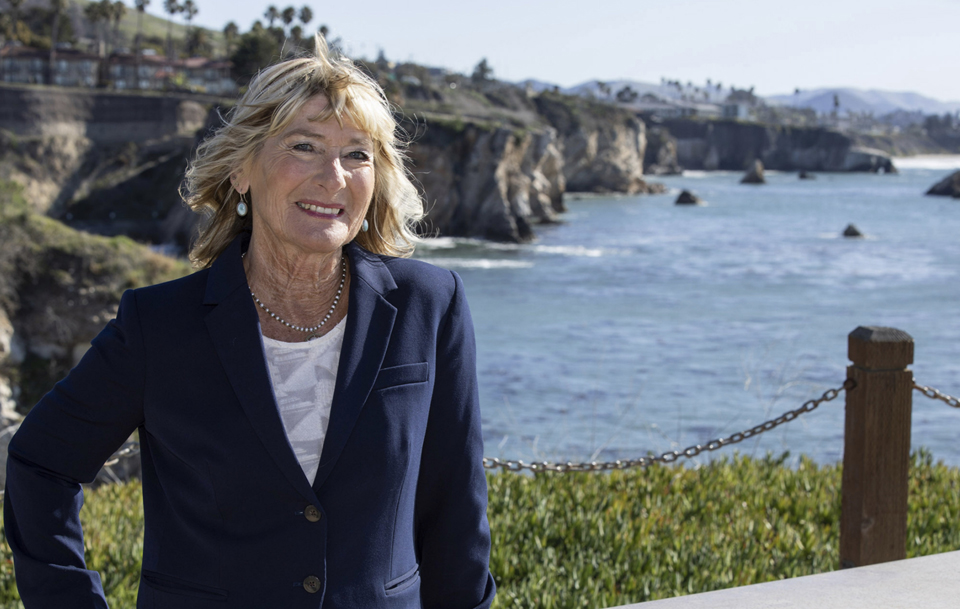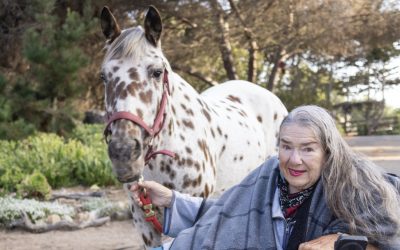San Luis Obispo native Tarren Collins was born to be an advocate, standing up for what she believes is right and just, even if it means bucking the status quo.
“I have always had an aversion to bullies,” Collins said. “I want the playing field to be level and fair. So often, those with special interests in developing for-profit are able to retain experts and consultants that will twist the truth. Somehow, it activates something in me. I don’t like the public being sold a bill of goods that’s not true.”
Collins is the fifth generation of her family to live on the coast in San Luis Obispo County and remembers her grandmother and aunt fighting the state for years to keep the family’s North Coast ranch in private ownership. They had to give up the land when she was 12.
Long before Collins was born, her ancestors drove cattle up to the county from Los Angeles, trading the herd for 3,000 acres of the former San Simeon Land Grant. Generations of her family were born and raised on the land that she visited many times as a child. “We got to spend a quite bit of time (at the family ranch) … the formative years,” Collins said about the property that’s now part of the Hearst San Simeon State Park. “By the time I was born, my dad’s parents lived in Santa Maria, but we would go to the ranch house and fish for steelhead. The whole family would gather there.” She added, “My grandmother would take us down the grassy slopes, the steep ones, on cardboard. It was such a great playground for being a child. She would show me all the wildflowers.”
“I have always had an aversion to bullies,” Collins said. “I want the playing field to be level and fair. So often, those with special interests in developing for-profit are able to retain experts and consultants that will twist the truth. Somehow, it activates something in me. I don’t like the public being sold a bill of goods that’s not true.”
Collins is the fifth generation of her family to live on the coast in San Luis Obispo County and remembers her grandmother and aunt fighting the state for years to keep the family’s North Coast ranch in private ownership. They had to give up the land when she was 12.
Long before Collins was born, her ancestors drove cattle up to the county from Los Angeles, trading the herd for 3,000 acres of the former San Simeon Land Grant. Generations of her family were born and raised on the land that she visited many times as a child. “We got to spend a quite bit of time (at the family ranch) … the formative years,” Collins said about the property that’s now part of the Hearst San Simeon State Park. “By the time I was born, my dad’s parents lived in Santa Maria, but we would go to the ranch house and fish for steelhead. The whole family would gather there.” She added, “My grandmother would take us down the grassy slopes, the steep ones, on cardboard. It was such a great playground for being a child. She would show me all the wildflowers.”
At that time, the family-owned the land from Pico Creek to San Simeon Creek, from the mountains to the ocean. Much of the property remained in her family for years until the state of California took the last of the acreage, Collins said.
“When (William Randolph) Hearst gave the castle to the state, the state immediately began eminent domain proceedings to take the land and make it the state park that it now is,” Collins explained. “My grandmother and her sister fought it for six years in court, and I think that influenced me to have a career in the law.”
Collins, who has been a practicing attorney for more than three decades, noted it was those childhood experiences with her grandmother that gave her a love for the environment, something she has advocated to protect for the majority of her adult life.
“The old ranching families and farmers definitely had an appreciation for making the land sustainable,” Collins said. “My grandmother instilled in me an appreciation and reverence for life. Life’s not cheap. You care for the land if you want it to sustain you. She was a huge influence on my life.”
“When (William Randolph) Hearst gave the castle to the state, the state immediately began eminent domain proceedings to take the land and make it the state park that it now is,” Collins explained. “My grandmother and her sister fought it for six years in court, and I think that influenced me to have a career in the law.”
Collins, who has been a practicing attorney for more than three decades, noted it was those childhood experiences with her grandmother that gave her a love for the environment, something she has advocated to protect for the majority of her adult life.
“The old ranching families and farmers definitely had an appreciation for making the land sustainable,” Collins said. “My grandmother instilled in me an appreciation and reverence for life. Life’s not cheap. You care for the land if you want it to sustain you. She was a huge influence on my life.”
Growing up in San Luis Obispo and watching her grandmother fight an uphill battle against the state to save her family home, Collins said it never crossed her mind she would one day stand up for the coast where she watched the sun set so many times as a teen. And she most definitely never considered a career in law when she graduated San Luis Obispo High School a year earlier than her classmates.
“I was planning to travel the world, so I saved up my money and was heading to Hawaii,” Collins said, noting she stopped in Oregon to see her boyfriend and wound up getting married.
She stayed in Oregon for four years, had a baby, got a divorce and moved back to the county with a six-month-old daughter, Kaia. “After a few years of working at my brother’s gas station and other jobs, I decided to enroll in Cuesta College,” Collins said, noting she chose the college because it had the best preschool in the area.
It was during her time at the community college Collins became active in student government, representing the school as a delegate at various meetings and conferences. She also organized an environmental awareness week at the campus, drawing guest speakers and allowing participating students to earn class credits for involvement. Collins also played on the school’s inaugural women’s softball team, graduating summa cum laude.
After Cuesta, Collins enrolled at Cal Poly, where she pursued a social sciences degree with an emphasis in prelaw. However, she still wasn’t thinking about law school at the time. “I just wanted to learn about children to start with,” Collins said, adding she had always been interested in civil rights, the Constitution, and what makes the country great. As a teen, she participated in silent vigils against the Vietnam War outside the Mission in downtown SLO. She also protested against the development of the Diablo Canyon Nuclear Power Plant.
It was during her last year at Cal Poly that a professor encouraged Collins to take the law school admissions test, she said, noting she did and scored in the 97th percentile. “I didn’t know anything about being a lawyer. I didn’t know any lawyers. I didn’t know anything about the law school admissions test,” Collins said. “I had planned to teach college before that (but) … sometimes you need the credentials to be the most effective advocate for the things you believe in.”
Collins was accepted to law school at UC Hastings in the Bay Area, where she relocated with her young daughter. The pair stayed in Northern California while Collins completed her law degree—she passed the bar exam on her first try—and began work as an attorney. She quickly realized living in the city wasn’t for her, though, so she returned home. “I have never been a city girl,” Collins said. “I just love the natural beauty of this area and wanted to join the effort to protect our quality of life here.”
Over the years, Collins helped form the SLO County Chumash Council, which has become a strong political force, chaired the local chapter of the Sierra Club, fought the Hearst Corporation in court several times and won, and attended more California Coastal Commission meetings than she can count.
After a decade of dedicating most of her waking hours to volunteer and advocacy work, Collins realized she needed to step back and focus on making her law practice viable, she said. “I was trying not to look because I care too much,” Collins said, adding she became involved in fighting for coastal and land-use rights again several years ago when a property owner blocked access to a bluff-top trail overlooking San Luis Bay. “I decided I had to stand up for what I believe in.”
She added, “We need people to carry the torch. If I have any lasting legacy, it would be to show people that their voice matters and to stand out and speak, even if your voice shakes.”
“I was planning to travel the world, so I saved up my money and was heading to Hawaii,” Collins said, noting she stopped in Oregon to see her boyfriend and wound up getting married.
She stayed in Oregon for four years, had a baby, got a divorce and moved back to the county with a six-month-old daughter, Kaia. “After a few years of working at my brother’s gas station and other jobs, I decided to enroll in Cuesta College,” Collins said, noting she chose the college because it had the best preschool in the area.
It was during her time at the community college Collins became active in student government, representing the school as a delegate at various meetings and conferences. She also organized an environmental awareness week at the campus, drawing guest speakers and allowing participating students to earn class credits for involvement. Collins also played on the school’s inaugural women’s softball team, graduating summa cum laude.
After Cuesta, Collins enrolled at Cal Poly, where she pursued a social sciences degree with an emphasis in prelaw. However, she still wasn’t thinking about law school at the time. “I just wanted to learn about children to start with,” Collins said, adding she had always been interested in civil rights, the Constitution, and what makes the country great. As a teen, she participated in silent vigils against the Vietnam War outside the Mission in downtown SLO. She also protested against the development of the Diablo Canyon Nuclear Power Plant.
It was during her last year at Cal Poly that a professor encouraged Collins to take the law school admissions test, she said, noting she did and scored in the 97th percentile. “I didn’t know anything about being a lawyer. I didn’t know any lawyers. I didn’t know anything about the law school admissions test,” Collins said. “I had planned to teach college before that (but) … sometimes you need the credentials to be the most effective advocate for the things you believe in.”
Collins was accepted to law school at UC Hastings in the Bay Area, where she relocated with her young daughter. The pair stayed in Northern California while Collins completed her law degree—she passed the bar exam on her first try—and began work as an attorney. She quickly realized living in the city wasn’t for her, though, so she returned home. “I have never been a city girl,” Collins said. “I just love the natural beauty of this area and wanted to join the effort to protect our quality of life here.”
Over the years, Collins helped form the SLO County Chumash Council, which has become a strong political force, chaired the local chapter of the Sierra Club, fought the Hearst Corporation in court several times and won, and attended more California Coastal Commission meetings than she can count.
After a decade of dedicating most of her waking hours to volunteer and advocacy work, Collins realized she needed to step back and focus on making her law practice viable, she said. “I was trying not to look because I care too much,” Collins said, adding she became involved in fighting for coastal and land-use rights again several years ago when a property owner blocked access to a bluff-top trail overlooking San Luis Bay. “I decided I had to stand up for what I believe in.”
She added, “We need people to carry the torch. If I have any lasting legacy, it would be to show people that their voice matters and to stand out and speak, even if your voice shakes.”
Collins believes she will never stop standing up for what she believes is right and making her voice heard, although she tends to spend more of her time these days volunteering for organizations such as the Point San Luis Lighthouse Keepers. “I just can’t help myself,” she said. “But I am trying to be more discerning about what I can lend my volunteer time to. I do see myself advocating, but, more importantly, I would love to help inspire future generations, empower them.”
Asked if she would change any of the time she has given to keeping the coast and local environment protected from development, Collins emphatically said she wouldn’t. “It has created tremendous meaning in my life,” she said. “When you work hard in one area, it can take away from other areas in your life. It would be easy to calculate all the hours (of volunteer work) … but it doesn’t replace the depth of meaning that it has had in my life.”
For more information about Collins, her advocacy and volunteer work or law practice, visit collinscoastlaw.com/about-tarren-collins.
Asked if she would change any of the time she has given to keeping the coast and local environment protected from development, Collins emphatically said she wouldn’t. “It has created tremendous meaning in my life,” she said. “When you work hard in one area, it can take away from other areas in your life. It would be easy to calculate all the hours (of volunteer work) … but it doesn’t replace the depth of meaning that it has had in my life.”
For more information about Collins, her advocacy and volunteer work or law practice, visit collinscoastlaw.com/about-tarren-collins.





